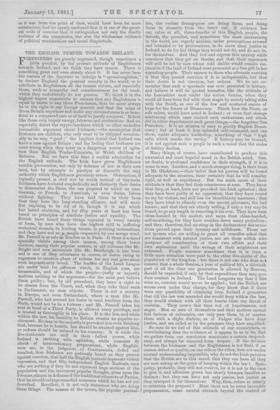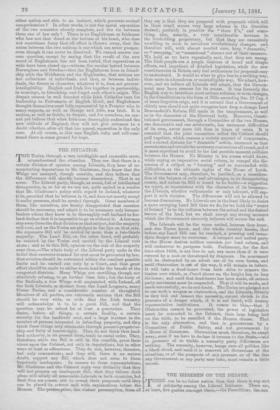THE ENGLISH TEMPER TOWARDS IRELAND.
FOREIGNERS are greatly impressed, though sometimes a little puzzled, by the present attitude of Englishmen towards Ireland, and we think they have reason. There is something great and oven stately about it. It has never been the custom of the Spectator to indulge in " spread-eagleism," to declare England the greatest country in the world, or to attribute to Englishmen all the human virtues, and especially those, such as sympathy and considerateness for the weak, which they undoubtedly do not possess. We think it in the highest degree unpatriotic to assume that any Englishman is equal in battle to any three Frenchmen, that we must always be in the right in any foreign quarrel, and that the reign of Great Britain anywhere and under any circumstances is so bene- ficial to a conquered race as of itself to justify conquest. Beliefs like those only impair energy, fairness, and moderation. And we especially detest the crypto-insolence which so often underlies journalistic argument about Irishmen,—the assumption that Irishmen are children, who only want to be whipped occasion- ally to be very "good ;" the implicit denial that Ireland can have a case against Britain ; and the feeling that Irishmen are more wrong when they enter on a dangerous course of agita- tion than English Trades-Unionists, or Welsh children of Rebecca. But we have this time a cordial admiration for the English attitude. The Irish have given Englishmen terrible provocation, not only by defiance of law in their own land, but by attempts to paralyse or discredit the only authority which Englishmen genuinely revere. Obstruction, if logically pressed, is civil war by words instead of bayonets. Irishmen have declared emphatically and distinctly their desire to dismember the State, the one proposal to which no race, German, or French, or American, or even Swiss, listens without fighting. They have told them to their faces that they hate the long-standing alliance, and will sacri- fice anything to be rid of it, though it is one which has lasted centuries, and for fifty years at least has been based on principles of absolute justice and equality. The British have heard these things repeated in every variety of form, by men who have the highest skill in inflicting oratorical wounds, in hurling taunts, in pointing insinuations, and they have not as 4, people responded by one savage word. Mr. Parnell is as safe in London as in Paris. If there is a mood specially visible among their masses, among their lower electors, among their popular orators, in old tribunes like Mr. Bright and new extremists like Mr. Bradlaugh, it has been and is one of deep reluctance to coerce, of desire rising to eagerness to sanction plans of redress for any real grievances even impracticably broad. The leaders of the Land League are under trial for 4)f:fences which, in English eyes, are treasonable, and of which the people—justly or unjustly matters nothing to the argument—for the most part believe them guilty ; but, by old precedent, they have a right to be absent from the Court, and, when they take their seats in Parliament, no man objects. There is not a country in Europe, not even Switzerland, where a man like Mr. Parnell, who had avowed his desire to rend territory from the State, would not be in a fortress ; and Mr. Parnell takes his seat as head of a Third Party, is allowed every privilege, and is treated as thoroughly in his place. It is the law, and while within the law, hie hostility to Britain creates no popular ex- citement. No man in the majority is provoked into even thinking that, because he is hostile, law should be strained against him, or redress should be refused to his country. It is while the Revolutionists are still in their fullest power, while Ireland is seething with agitation, while rumours fly about of insurrectionary preparations, while English- men are, in the judgment of Continentals, defied and insulted, that Irishmen are patiently heard as they protest against coercion, that half the English journals deprecate violent repression, and that fifty independent English Radicals, men who are nothing if they do not represent huge sections of the population and the innermost popular thought, press upon the Premier, almost in defiance of the traditional etiquette of Parties, that he should enlarge remedial measures which he has not yet described. Recollect, it is not only statesmen who are doing these things. The masses of the towns, the popular journal-
ists, the veriest demagogues are doing them, and doing them in sincerity from the heart out. If evidence has any value at all, three-fourths of this English .people, the fiercest, the proudest, and sometimes the most unreasoning in the world, are eagerly anxious, under provocations avowed and intended to be provocations, to do more than justice to Ireland, to do for her things they would not do, and do not do, for themselves. And they feel and express this anxiety while conscious that they get no thanks, and that their opponents will still be led by men whose cold dislike would remain im- placable if the land of Ireland were presented as a free gift to her appealing people. Their answer to those who advocate coercion is that they permit coercion if it is indispensable, but that their desire is not coercion, but redress. We do not re- member that such a spectacle was ever presented in history, and believe it will be quoted hereafter, like the attitude of the Lancashire men under the cotton famine, when they could all have been fed with their staple by merely taking sides with the South, as one of the few and scattered omens of hope for the future of Democracy. Think how the Peers, as solo rulers, would have acted in Ireland ; or even that strange aristocracy which once excited such enthusiasm, and which did in other departments such great things,—the forgotten Ten Pounders. It is no mission of ours to glorify English Demo- cracy ; but at least it has splendid self-command, and can show, under adequate leadership, something of that " high calm which marks the strong." If history may be trusted, it is not against such a people in such a mood that the scales of destiny decline.
Many things, of course, have contributed to produce this unwonted and most hopeful mood in the British mind. One, no doubt, is profound confidence in their strength, if it is to come to war. Another, and a much stronger thing, is their trust in Mr. Gladstone,—their belief that his powers will be found adequate to the occasion, their certainty that he will consider right, as well as expediency. But the main cause of their attitude is that they feel their consciences at ease. They know that they, at least, have not provoked this Irish agitation ; that they have been guilty of no oppression, that they have raised no cry for violent, and still less for bloodthirsty measures ; that they have tried to remedy even the special grievance, the bad tenure ; and that they are utterly willing, if only a way may be found, to go any length in removing it for ever. They have been clean-handed in the matter, and more than clean-handed, self-sacrificing, for they have trodden down many prejudices ; and they, therefore, feel no sting in the declamatory denuncia- tions poured upon their tyranny and selfishness. Those are not tyrants who are willing to grant all remedies asked that are consistent with natural justice, nor are those selfish who postpone all consideration of their own affairs and their own aspirations until the wrongs of their neighbours are redressed. People murmur sometimes that it is time a little more attention were paid to the other five-sixths of the population of the kingdom ; but there is not one who does not consent that a whole Session, a year of political life, a thirtieth part of all the time one generation is allowed by Heaven, should be expended, if only by that expenditure they may pro- duce content in Ireland. The Land Leaguers say that if this were so, coercion would never be applied ; but the British are serene even under that charge, for they know that if there were any possibility of obtaining from Ireland a guarantee that till the law was amended she would keep within the law, they would abstain with all their hearts from any threat of coercion. They coerce this time out of hopelessness, not anger. Men so sure of themselves and their motives cannot feel furious at calumnies, can only pass them by or answer them with a slight disdain, as of Judges who have done justice, and are railed at by the prisoners they have acquitted.
So sure do we feel of this attitude of our countrymen, so overwhelming does the evidence of it appear to us to be, that wo gather from our conviction sometimes a certain despond- ency, not always far removed from despair. If the division between the Irishman and the Englishman is not final, if an unseen defect or quality; on one side or the other, does not render mutual understanding impossible, why do not the Irish perceive that the British are in this mood, that they can have all they are now asking at the price of keeping within the law ? Sym- pathy, probably, they will not receive, for it is not in the race to give it, and affection grows but slowly between families so distinct ; but they can have not only justice, but justice as they interpret it for themselves. Why, then, refuse so utterly to entertain the proposal ? Must there not be some incurable prepossession, some mental obstacle beyond the control of either nation and akin to an instinct, which prevents mutual comprehension ? In other words, is not the moral separation of tho two countries already complete, and the tie between them one of law only ? There is no Englishman or Irishman who has not that dread at the bottom of his heart, who does not sometimes fancy that all effort is thrown away, that the union between the two nations is one which can never prosper, even though it can never be dissolved. We cannot answer our own question, except by saying that the result of the new mood of Englishmen has not been tested, that separations as wide have been closed up—witness the secular hatred between Norwegians and Swedes—that the Englishman lives in friend- ship with the Welshman and the Highlander, that nations are but collections of individuals, and that, as between indivi- duals, the fissure in character, whatever it is, does not prevent intelligibility. English and Irish live together in partnership, in marriage, in friendship, and forget each other's origin. The despair cannot be well founded while Irish Catholics turn for leadership to Protestants of English blood, and Englishmen thought themselves most fully represented by a Premier who in many respects, as well as lineage and title, was Irish. It is useless, as well as feeble, to despair, and for ourselves, we can- not yet believe that when Irishmen thoroughly understand the new attitude of England, they will not give entrance to a doubt whether, after all that has passed, separation is the only cure. At all events, in this new English calm and self-com- mand there is some ground for hope.



































 Previous page
Previous page